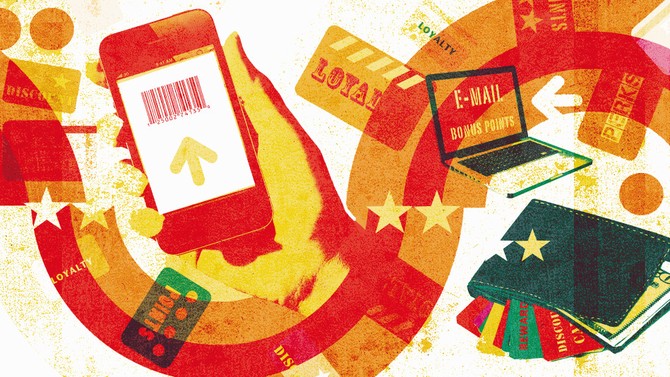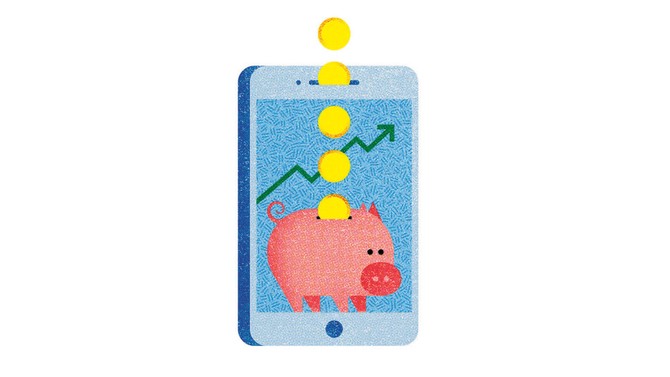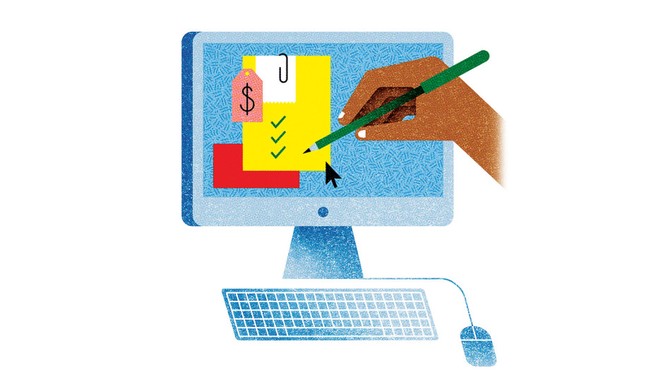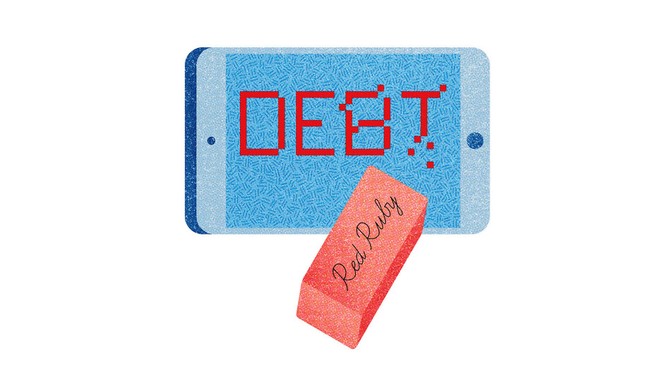This App Helps You Pay Down Debt Faster
The latest and greatest in personal finance apps and websites.
By Farnoosh Torabi

Illustration: Lan Truong
Sure, you may use a banking app or two, but you might not know that these handy helpers can do so much more than just track expenses. In fact, they can act as your personal mobile financial advisers, nudging you forward and keeping you accountable so you can achieve your money goals.
If you're hesitant about jumping in with both feet, know that financial technology (or "fintech") is far from a passing fad; it'll become an even bigger part of our banking and investing experiences in the future. And if safety's a concern, rest assured: As the app market has advanced over the years, so has its focus on security and data privacy. It's in the makers' best interest to protect our financial information since their reputation and bottom line depend on it. So get out your smartphone and try these fantastic, futuristic resources designed to help you master your money in the new year.
If you're hesitant about jumping in with both feet, know that financial technology (or "fintech") is far from a passing fad; it'll become an even bigger part of our banking and investing experiences in the future. And if safety's a concern, rest assured: As the app market has advanced over the years, so has its focus on security and data privacy. It's in the makers' best interest to protect our financial information since their reputation and bottom line depend on it. So get out your smartphone and try these fantastic, futuristic resources designed to help you master your money in the new year.

Illustration: Lan Truong
Save and Invest
Qapital
This user-friendly app lets you define your financial goals and automate savings to reach them. Qapital works in tandem with other platforms you may already use, like banking or fitness apps, to put aside money based on rules you set; you can make stormy days less gloomy by telling it to save $20 every time it rains, or charge yourself a $5 guilty pleasure tax each time you splurge on clothes.
Cost: Free.
The typical Qapital user saves $100 to $300 per month.
Ellevest
The brainchild of Wall Street veteran Sallie Krawcheck, Ellevest is a digital platform designed for women that creates customized investing plans based on personal goals (such as early retirement or starting a business). It takes into account women's longer life expectancy and that a woman's salary peaks earlier in her career.
Cost: Ellevest charges 0.5 percent of assets under management annually (e.g., $5 for every $1,000 in investments) and has no minimum investment balance.
Ninety-two percent of women want to learn more about financial planning, according to a 2015 study.
Tip Yourself
Finally quit smoking? Hit the gym early? Why not tip yourself? This app lets you do just that—simply tell it to deposit a few bucks from your bank account into the app's virtual Tip Jar (an FDIC-insured online bank account) for any job well done. You can transfer the cash back whenever you want. Cofounder Lukas Carvajal hopes the app helps change people's money mindset. "Rather than viewing saving as something we have to do, we should view it as a reward," he says.
Cost: Free.
This user-friendly app lets you define your financial goals and automate savings to reach them. Qapital works in tandem with other platforms you may already use, like banking or fitness apps, to put aside money based on rules you set; you can make stormy days less gloomy by telling it to save $20 every time it rains, or charge yourself a $5 guilty pleasure tax each time you splurge on clothes.
Cost: Free.
The typical Qapital user saves $100 to $300 per month.
Ellevest
The brainchild of Wall Street veteran Sallie Krawcheck, Ellevest is a digital platform designed for women that creates customized investing plans based on personal goals (such as early retirement or starting a business). It takes into account women's longer life expectancy and that a woman's salary peaks earlier in her career.
Cost: Ellevest charges 0.5 percent of assets under management annually (e.g., $5 for every $1,000 in investments) and has no minimum investment balance.
Ninety-two percent of women want to learn more about financial planning, according to a 2015 study.
Tip Yourself
Finally quit smoking? Hit the gym early? Why not tip yourself? This app lets you do just that—simply tell it to deposit a few bucks from your bank account into the app's virtual Tip Jar (an FDIC-insured online bank account) for any job well done. You can transfer the cash back whenever you want. Cofounder Lukas Carvajal hopes the app helps change people's money mindset. "Rather than viewing saving as something we have to do, we should view it as a reward," he says.
Cost: Free.

Illustration: Lan Truong
Pay invoices and Track Expenses
Unbill
Struggling to keep track of all your bills? This app collects them in one place, then monitors and pays them using your linked bank account, debit card, or credit card. Unbill also helps you split expenses with others, like the Netflix account you share with your roommate.
Cost: The app adds a 99-cent fee each time it pays a bill via an eCheck from your bank account. Pay with your debit or credit card, and the fee's either 99 cents or 2.49 to 2.99 percent of the bill (whichever is greater).
Spendee Premium
Tell this app where your money goes, and it'll analyze your expenses and help set budgets for different categories (like travel and food) so you don't end the month cash poor. You can be notified when you're nearing a spending threshold, and create accounts with family and friends to keep tabs on household and shared expenses.
Cost: $1.99 a month or $14.99 per year.
SupportPay
Frustrated by conversations with her ex about money, single mom and tech entrepreneur Sheri Atwood launched SupportPay, a child-support platform that lets families see how and when money is spent on kids. You can set reminders, upload receipts, resolve payment disputes, and keep relevant court-certified records in a single central spot.
Cost: SupportPay Lite, which includes basic transaction entries and expense tracking dating back six months, is free. The highest-tier plan, SupportPay Legal, is $12.99 per month, billed annually, and includes unlimited tracking and entries, phone support, and court-ready documents with tracked expenses.
Struggling to keep track of all your bills? This app collects them in one place, then monitors and pays them using your linked bank account, debit card, or credit card. Unbill also helps you split expenses with others, like the Netflix account you share with your roommate.
Cost: The app adds a 99-cent fee each time it pays a bill via an eCheck from your bank account. Pay with your debit or credit card, and the fee's either 99 cents or 2.49 to 2.99 percent of the bill (whichever is greater).
Spendee Premium
Tell this app where your money goes, and it'll analyze your expenses and help set budgets for different categories (like travel and food) so you don't end the month cash poor. You can be notified when you're nearing a spending threshold, and create accounts with family and friends to keep tabs on household and shared expenses.
Cost: $1.99 a month or $14.99 per year.
SupportPay
Frustrated by conversations with her ex about money, single mom and tech entrepreneur Sheri Atwood launched SupportPay, a child-support platform that lets families see how and when money is spent on kids. You can set reminders, upload receipts, resolve payment disputes, and keep relevant court-certified records in a single central spot.
Cost: SupportPay Lite, which includes basic transaction entries and expense tracking dating back six months, is free. The highest-tier plan, SupportPay Legal, is $12.99 per month, billed annually, and includes unlimited tracking and entries, phone support, and court-ready documents with tracked expenses.

Illustration: Lan Truong
Clear Your Credit
Pay Off Debt
One of the first apps of its kind in the iPhone App Store, Pay Off Debt helps you deal with credit card debt using the snowball method (paying off your lowest balance first), the avalanche approach (starting with the card that has the highest interest rate), or any other order you choose. Upload an image that represents why you want to get out of debt (e.g., the condo you want to buy, the city you hope to visit) to stay motivated.
Cost: $4.99.
The average credit card debt for U.S. households that carry a balance is $16,048.
Want more advice like this delivered to your inbox? Sign up for the Oprah.com Money Newsletter!
Farnoosh Torabi is a personal finance expert, the author of When She Makes More, and the host of CNBC's Follow the Leader and the award-winning podcast So Money.
Credit card stat source: American Credit Card Debt Statistics & Key Findings—Updates May 2016, ValuePenguin.com
One of the first apps of its kind in the iPhone App Store, Pay Off Debt helps you deal with credit card debt using the snowball method (paying off your lowest balance first), the avalanche approach (starting with the card that has the highest interest rate), or any other order you choose. Upload an image that represents why you want to get out of debt (e.g., the condo you want to buy, the city you hope to visit) to stay motivated.
Cost: $4.99.
The average credit card debt for U.S. households that carry a balance is $16,048.
Want more advice like this delivered to your inbox? Sign up for the Oprah.com Money Newsletter!
Farnoosh Torabi is a personal finance expert, the author of When She Makes More, and the host of CNBC's Follow the Leader and the award-winning podcast So Money.
Credit card stat source: American Credit Card Debt Statistics & Key Findings—Updates May 2016, ValuePenguin.com
From the January 2017 issue of O, The Oprah Magazine

